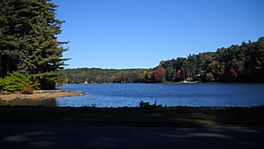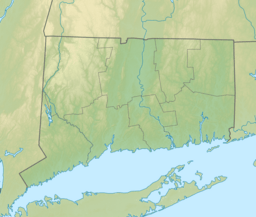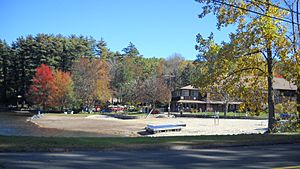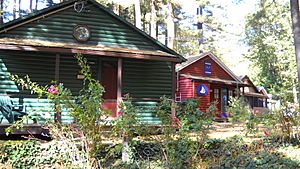Pinewood Lake facts for kids
Quick facts for kids Pinewood Lake |
|
|---|---|

Pinewood Lake
|
|
| Location | Fairfield County, Connecticut |
| Coordinates | 41°15′22″N 73°10′34″W / 41.256°N 73.176°W |
| Type | lake |
Pinewood Lake is a natural lake found in Trumbull, Connecticut. It is located near Mischa Hill, which is about 330 feet (100 m) tall. The lake is part of a special area called the Nichols Farms Historic District.
Contents
Pinewood Lake: A Private Community
Pinewood Lake is a private place. It is used by a special community called the Pinewood Lake Association. This means the public cannot access the lake or its facilities.
The Pinewood Lake Association takes care of many things. They maintain the lake itself and a clubhouse. They also look after several boat racks and two dams. There is a common beach for members to use. The association also manages small land areas between the houses around the lake.
Pinewood Lake's Early History
The area around Pinewood Lake has a long history. It was once home to Mischa, a member of the Golden Hill Paugussett Indian Nation. Later, English settlers arrived in the 1600s. They called the natural lake "Old Farm Pond."
Old Farm Pond was quite large. It was about 1150 feet (350 m) long. At its widest point, it stretched about 775 feet (236 m) across. Two streams, Booth Hill Brook and Bears Den Brook, fed into this pond. They joined together about 1550 feet (470 m) before reaching the pond.
Pine Brook Country Club: A Theater Hub
In 1930, a man named Benjamin Plotkin bought Pinewood Lake. He also bought the land around it. Plotkin had a big dream. He wanted to create a summer resort for people to enjoy plays.
He built an auditorium with a stage that could spin around. He also built forty cabins for guests to stay in. This new place was called the Pine Brook Country Club.
The Group Theatre at Pine Brook
Pine Brook Country Club became famous for an important event in American theater history. In the summer of 1936, a group of artists came to stay there. This group was called The Group Theatre. It was formed in New York City by Harold Clurman, Cheryl Crawford, and Lee Strasberg.
The Group Theatre included talented actors, directors, playwrights, and producers. They worked together at Pine Brook. They created plays that showed real life. Their work changed how plays and movies were made forever.
Many famous artists spent their summers at Pine Brook Lake. Some of them include Elia Kazan, Harry Morgan, John Garfield, Frances Farmer, Will Geer, Howard Da Silva, Clifford Odets, Lee J. Cobb, and Irwin Shaw.
In 1944, the Pine Brook Country Club was sold. It was then reorganized and became the Pinewood Lake Association. This is the same association that manages the lake today.
Pinewood Lake's Environment
Pinewood Lake gets its water from three streams. These streams can carry things like dirt and chemicals into the lake. They can also bring in things like phosphorus and nitrates from fertilizers. Sometimes, they bring in bacteria like E. coli.
The lake is cleaned regularly to remove silt. Silt is fine dirt that builds up and can make the lake shallower over time. This cleaning helps keep the lake from turning into a meadow.
Lake Life and Challenges
The lake is home to many living things. You can find snails, leeches, and different insects there. Tough fish like sunnies and perch live in the lake all year. Other fish, such as trout and bass, are added to the lake each spring.
Keeping the lake healthy is a constant challenge. Sometimes, unwanted organisms appear. Over the years, there have been times when too much algae grew. There have also been problems with water weeds like Valisineria.
Changes in weather, chemicals from runoff, and silt levels can affect the lake. Even geese that live near the lake can impact its health. All these things make it tricky to keep the water clear for swimming and boating.
However, the lake can clean itself naturally to some extent. The Lake Water Quality Committee also works hard to keep the water safe. They design and carry out careful practices. As of 2006, there have been no signs of zebra mussels, which are harmful invasive species.
Images for kids
 | Selma Burke |
 | Pauline Powell Burns |
 | Frederick J. Brown |
 | Robert Blackburn |





